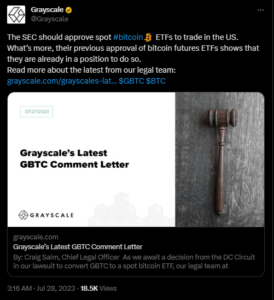Crypto fund manager Grayscale sent a letter to the SEC on July 27, addressing eight spot Bitcoin ETF registrations and requesting the Securities and Exchange Commission to approve all proposed spot Bitcoin exchange-traded funds (ETFs).
The letter asserted that the SEC may approve the spot ETFs based on its approval of Bitcoin futures ETFs, claiming that the two fund types are “inextricably linked.”
Grayscale stated that the most recent surveillance sharing agreements (SSAs) between Coinbase and the producers of spot ETFs are “not a new idea” and that they would not adhere to SEC requirements.

ETF registrations from Fidelity, BlackRock, Invesco, Wisdom, VanEck, Valkyrie and ARK Invest have recently been upgraded to incorporate SSAs with Coinbase.
Coinbase will submit information about its trading books as well as other information for the SEC to keep an eye out for any potential market manipulation or erroneous trading activity.
Due to the lack of SSAs, the SEC argued against the ETFs in late June, arguing that they were required in order to prevent the possibility of manipulating the cryptocurrency markets.
In contrast, Grayscale asserted that the SSAs “would neither fulfil nor be needed” in accordance with SEC requirements because Coinbase is neither authorised with the Commodity Futures Trading Commission as a futures exchange nor with the SEC as a broker-dealer or securities exchange.
It was stated that the approval of the ETFs would “improperly grant these proposals an unjustly biassed and unfair first-mover benefit” and represent “a favourable but sudden important change” in the SEC’s application of its standards.
According to Salm, the Grayscale Bitcoin Trust (GBTC), which tries to monitor Bitcoin’s price, has close to 1 million investors.
Salm added, there is “simply no reason” the SEC should prevent GBTC investors from purchasing a spot Bitcoin ETF. He continued and said if it were converted to an ETF, investors would receive billions in value back.
Last June, the SEC turned down Grayscale’s request to turn the GBTC into a spot Bitcoin ETF.
As a result, Grayscale filed a lawsuit against the regulator, alleging that it was operating unfairly by not treating investment instruments equally.




